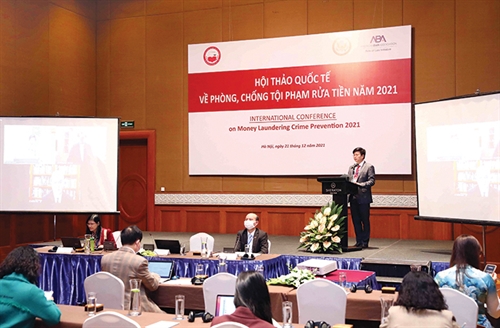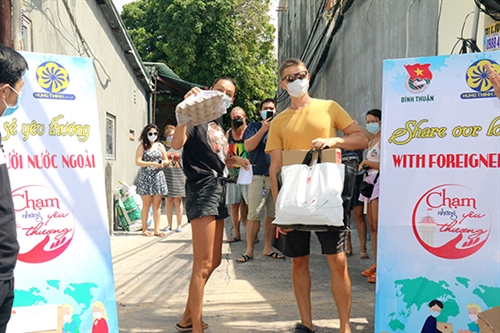The Government has recently submitted to the National Assembly Standing Committee a draft resolution on overtime work under which the monthly maximum number of extra working hours would rise to 72 from the current limit of 40.
The cabinet also proposed applying the yearly overtime cap of 300 hours to all businesses, rather than restricting to some fields such as textile and garment, footwear, argo-forestry-fisheries processing, salt making, oil refining, electricity generation and supply, water supply and drainage, and electric and electronics manufacturing as currently prescribed.
According to Minister of Labor, Invalids and Social Affairs Dao Ngoc Dung, the proposal is made to help businesses restore production and business activities amid the COVID-19 pandemic. The new regulations would apply until December 31, 2024, when enterprises are expected to fully recover.
Economic benefits
Statistics from the Ministry of Labor, Invalids and Social Affairs (MOLISA) showed that amid the fourth wave of the COVID-19 pandemic, businesses, especially those operating in labor-intensive fields like textile-garment and leather-footwear, are facing a reduction of 30-50 percent of the workforce and, as a result, can hardly fulfill orders in time.
Since last October when the proposal was first released by the MOLISA for public comment, it has been warmly welcomed by businesses that have been facing labor shortage after months of social distancing as many workers have fled to their hometowns during the lockdown period and not yet returned to work. A recent survey found that only 141 of 265 enterprises in the South maintain operation, with the number of workers is just one-fourth of that before social distancing, the VietnamNet newswire reported.
Talking with correspondents from the Sai Gon Giai Phong online, General Secretary of the Vietnam Chamber of Commerce and Industry Tran Thi Lan Anh said the overtime hour rise shows the companionship of the Government to businesses nationwide, helping enterprises timely process orders, thus improving their performance.
Head of Human Resources and System Management Department in Fly Garment Co. Ltd. Phan Thanh Binh commented that the textile industry has always flexibly increased overtime when orders are pressing. It is not to mention the fact that most businesses in the industry frequently face a labor shortage of 20-30 percent in production lines since female workers are in maternity leave.
“Now that the pandemic unexpectedly comes, the issue becomes more serious, and this is the reason why the overtime cap rise is wholeheartedly supported by all companies in the industry,” Binh was quoted by the Sai Gon Giai Phong as saying.An export production line of Garment 10 Corporation JSC.__Photo: Tran Viet/VNA
Though agreeing with the proposal, some businesses stress that they need a higher overtime cap not to make more profits but because their business is seasonal.
Tran Tien Phat, COO of electronics manufacturer Datalogic Vietnam LLC in HCMC’s Thu Duc city, revealed with online newspaper VnExpress that his company’s workers have to work four hours overtime each day in the last quarter when the company receives orders exceeding its capacity. “But this happens only for several months and the company cannot recruit more workers for just one quarter,” he said.
Sharing Phat’s view, Nguyen Thi Lien, COO of Phong Phu International JSC also in Thu Duc city, said garment companies have been requesting a higher overtime cap for years as their work was seasonal.
Not only employers but also employees support the proposal to lift the overtime cap as well.
After six years of working for Thuong Dinh Garment Company in Ho Chi Minh City, Nguyen Thi Thao gets over VND 5 million (USD 220) a month, of which she spends 60 percent on house rent and taking care of her 12-year-old son who is currently living with Thao’s parents in Ben Tre province.
“Working overtime is tiring, but it is beneficial in many ways,” Thao told VnExpress, adding that this is the only way she can increase her income.
A survey by the Vietnam General Confederation of Labor in October last year showed that over 80 percent of workers were willing to work more than 40 hours of overtime each month, or 200-300 hours a year. The main reason for this willingness was that their current incomes were too low to make ends meet, the survey found.
Concerns about workers’ health
Despite its economic effects, the proposal gave rise to big concerns about workers’ health and their families’ well-being.
Nguyen Thi Dan, former head of the MOLISA’s Office in the South, said that although the global trend is to reduce working hours, the opposite is true in Vietnam. The overtime cap has increased from 30 hours in 2012 to 40 hours in 2019 and now the labor ministry is proposing 72 hours. Hence, the increase in overtime cap should only be applied in the short term to aid economic recovery during the post-pandemic period, the expert suggested.
“An eight-hour work time frame ensures that workers have enough time to rest, and extending this will see their health deteriorate in the long run,” Dan told VnExpress.
Moreover, when workers have to work overtime, they will have less time to care for and protect their children. Consequently, an increase in extra working hours probably brings economic efficiency to businesses and additional income to workers but seemingly ignores the next generation, Dan said.
Ngoc Bich, a colleague of Thao, worried about how to take care of her children in case she has to work extra hours.
“I don’t have the right to choose whether to work overtime or not. If the company requires working overtime, I have to do as I’m part of a production line. If my husband also comes home late due to overtime work, my kids will have no choice but to cook and eat instant noodles on their own,” Bich gushed.
Dr. Vu Minh Tien, Director of the Institute for Workers and Trade Unions under the Vietnam General Confederation of Labor, expressed his view that working overtime benefits both employers and employees but employees encounter long-term health problems whereas employers are on the safe side. “Moreover, reality shows that if the daily working hours is 10 or more, productivity will decline while occupational accidents will increase,” Tien added.
Dr. Le Duy Binh, director of Economica Vietnam, pointed out the necessity for evaluating comprehensive impacts of the overtime cap increase. According to Binh, when the Government sought opinions of the business community to revise the Labor Code, many associations and businesses did not want to set a monthly overtime cap of 40 hours but suggested that the Code only provide for a total overtime limit for the whole year.
If the monthly overtime cap is now removed for all businesses regardless of their fields of operation, employers will immediately require employees to work extra hours, Binh noted, explaining that any employer wants to optimize machine utilization and performance with the lowest number of workers. “When the overtime limit is raised, enterprises will not hire new employees so as to reduce their payable social insurance and health insurance premiums, thus saving production costs. In the long run, the number of unemployed persons will increase, exerting negative impacts on the labor market,” Binh analyzed.
Addressing the National Assembly Standing Committee’s meeting, head of the National Assembly’s Committee for Social Affairs Nguyen Thuy Anh said her Committee, in the capacity as the verifying agency, basically agrees with the Government’s intention to loosen the overtime limit, considering it a short-term solution for removing businesses’ difficulties amid the COVID-19 pandemic. However, an increase of the monthly overtime cap from 40 hours to 72 hours seems inappropriate, especially when its possible impacts on workers’ health have not yet been thoroughly studied. Therefore, the Committee recommended increasing the monthly overtime cap to 56 hours or 60 hours only for trades, occupations and jobs currently allowed to apply the overtime limit of 300 hours per year.-









